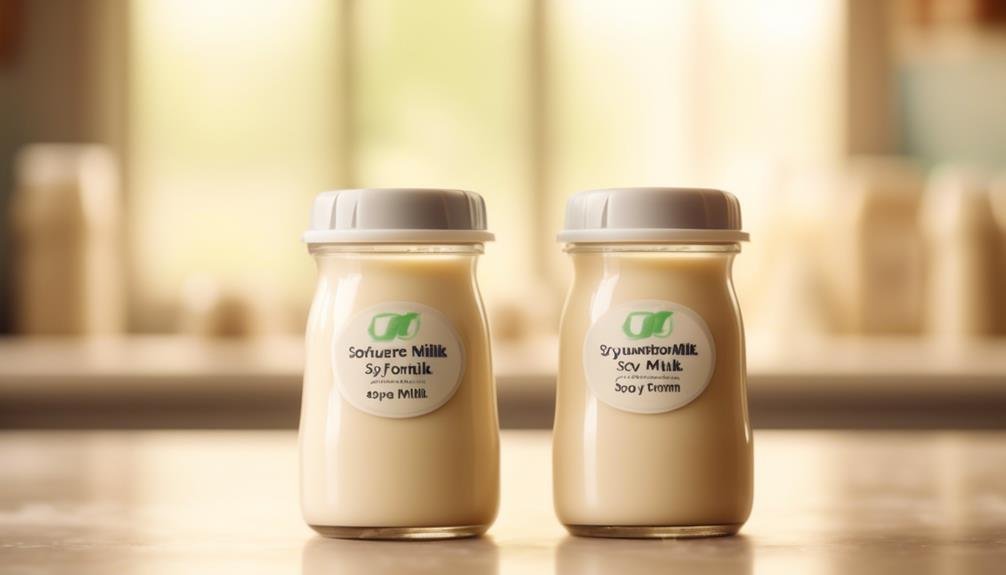"Cherishing Little Steps - A Haven for Baby and Family Journeys"
Soy Alternatives for Babies
They say 'you are what you eat,' and this rings especially true when it comes to the health and well-being of your little one. As a parent, you want to provide the best nutrition for your baby, but what if your child has an allergy or sensitivity to dairy?
This is where soy alternatives come into play. In this discussion, we will explore the benefits of soy alternatives, the nutritional content of soy products, considerations for introducing soy to babies, and much more.
So, if you're looking for options beyond traditional dairy-based products, buckle up and get ready to discover the world of soy alternatives for your little bundle of joy.
Key Takeaways
- Soy alternatives for babies are a good source of protein, essential vitamins, and minerals, which are important for growth and development.
- Soy alternatives are suitable for babies with lactose intolerance or cow's milk allergy, providing an allergy-friendly option.
- Soy alternatives may be easier for some babies to digest, reducing the risk of gastrointestinal discomfort.
- Soy alternatives offer a plant-based alternative to animal-based dairy products, providing a variety of options for parents to choose from.
Benefits of Soy Alternatives

Soy alternatives offer numerous benefits for babies, providing a nutritious and easily digestible option for those who may have allergies or sensitivities to dairy or other common ingredients. One of the main benefits of soy alternatives is that they're a good source of protein. Protein is essential for the growth and development of babies, helping to build strong muscles and tissues. Soy-based formulas, for example, contain all the essential amino acids that babies need.
Another benefit of soy alternatives is that they're often fortified with essential vitamins and minerals. These include calcium, iron, and vitamin D, which are crucial for healthy bone development and overall growth. Moreover, soy alternatives are lactose-free, making them suitable for babies with lactose intolerance.
While soy alternatives offer several benefits, it's important to note that they may come with some risks as well. Some studies suggest that high levels of soy consumption in infants may affect their hormonal balance. However, the American Academy of Pediatrics states that moderate soy consumption, such as through soy-based formulas, appears to be safe for most infants.
It is always recommended to consult with a healthcare professional before introducing soy alternatives to your baby's diet to ensure it's the right choice for your little one.
Nutritional Content of Soy Products
When it comes to the nutritional content of soy products, it's important to understand the key components that make them a beneficial option for your baby's diet. Here are some important points to consider:
- Protein: Soy products are rich in high-quality protein, which is essential for your baby's growth and development. Soy protein contains all the essential amino acids that your baby needs for healthy muscle and tissue formation.
- Fiber: Soy products are a good source of dietary fiber, which promotes healthy digestion and helps prevent constipation in babies. Fiber also helps regulate blood sugar levels and keeps your baby feeling full and satisfied.
- Vitamins and Minerals: Soy products are fortified with essential vitamins and minerals, including calcium, iron, and vitamin D. These nutrients are important for your baby's bone development, oxygen transport, and overall health.
- Soy-based infant formula: If you choose to feed your baby formula, soy-based options are available. These formulas are nutritionally balanced and provide all the necessary nutrients for your baby's growth and development. They're also suitable for babies with lactose intolerance or cow's milk protein allergy.
Including soy products in your baby's diet can offer numerous benefits, including a good source of protein, fiber, and essential vitamins and minerals. However, it's always important to consult with your pediatrician before introducing any new food or formula to your baby.
Considerations for Introducing Soy to Babies

To ensure a smooth introduction of soy into your baby's diet, it's important to consider a few key factors.
Introducing soy-based baby food or transitioning to soy-based formula can be a beneficial option for babies who've allergies or sensitivities to dairy or who follow a vegan diet. However, it's crucial to consult with your pediatrician before making any changes to your baby's diet.
When introducing soy-based baby food, start with small quantities and observe your baby for any adverse reactions such as diarrhea, vomiting, or rashes. It's recommended to wait three to five days before introducing another new food to monitor for potential allergies. Additionally, choose organic and non-GMO soy products to minimize the risk of exposure to harmful pesticides and genetically modified organisms.
Transitioning to soy-based formula should also be done gradually to allow your baby's digestive system to adjust. Begin by replacing one feeding with soy formula and gradually increase the amount over a few weeks. Keep in mind that soy formula may have a different taste compared to breast milk or regular formula, so your baby may need time to adapt.
Potential Allergies and Sensitivities to Soy
If your baby has a soy allergy or sensitivity, it's important to be aware of the potential symptoms and take appropriate measures to ensure their health and well-being. Soy allergies are one of the most common food allergies in infants, and can cause a range of symptoms, from mild to severe.
Some infants may experience immediate reactions, such as hives, swelling, or difficulty breathing, while others may have delayed symptoms, such as eczema or digestive issues. If you suspect your baby has a soy allergy, it's recommended to consult with a healthcare professional for proper diagnosis and guidance.
Here are some important points to consider regarding soy allergies and sensitivities in babies:
- Allergy testing: If you suspect your baby has a soy allergy, allergy testing can help confirm the diagnosis. This may involve skin prick tests or blood tests to detect specific antibodies.
- Breastfeeding alternatives: If your baby has a soy allergy and you're breastfeeding, you may need to eliminate soy from your diet. It's important to work with a healthcare professional or dietitian to ensure proper nutrition and to explore alternative formulas or feeding options for your baby.
Comparing Soy Milk and Soy Formula

If your baby has a soy allergy or sensitivity, you may be wondering about the differences between soy milk and soy formula. When it comes to soy milk vs cow milk, it's important to note that soy milk is a plant-based alternative to cow's milk. Soy milk is made from soybeans and doesn't contain lactose, making it suitable for babies with lactose intolerance or a milk allergy. On the other hand, cow's milk contains lactose and proteins that may be difficult for some babies to digest.
When comparing soy formula vs breastfeeding, it's worth mentioning that breastfeeding is considered the best option for infants. Breast milk provides all the necessary nutrients and antibodies to support your baby's growth and immune system. However, in cases where breastfeeding isn't possible or insufficient, soy formula can be a suitable alternative.
Soy formula is specifically designed to mimic the nutritional composition of breast milk. It's made from soy protein and fortified with essential vitamins and minerals. It provides a complete source of nutrition for infants who can't tolerate cow's milk or who've a soy allergy.
Tips for Choosing and Preparing Soy Alternatives
When choosing and preparing soy alternatives for your baby, it's essential to consider their nutritional needs and ensure proper preparation to maintain their health and well-being. Here are some important tips to help you make the best choices and prepare soy alternatives for your little one:
- Choosing alternatives:
- Consult with your pediatrician: Talk to your child's healthcare provider before introducing any new soy-based products. They can provide guidance on whether soy is a suitable alternative for your baby.
- Read the labels: Look for soy alternatives that are specifically formulated for infants and meet the nutritional requirements for their age. Ensure that the product is free from additives, preservatives, and artificial flavors.
- Preparing alternatives:
- Follow instructions: Carefully read and follow the instructions provided on the packaging for preparing the soy alternative. This will help ensure that your baby receives the correct concentration and consistency.
- Sterilize equipment: Before preparing the soy alternative, sterilize all bottles, nipples, and utensils to minimize the risk of contamination.
- Store properly: If you're preparing a batch of soy alternative in advance, divide it into individual portions and store them in clean, airtight containers in the refrigerator. Use within 24 hours to maintain freshness and safety.
Consulting With a Pediatrician: What to Know

To ensure the best choices and preparation of soy alternatives for your baby, consulting with a pediatrician is crucial for understanding the specific considerations and recommendations tailored to your child's needs. Your pediatrician can provide expert guidance on introducing soy alternatives into your baby's diet, taking into account any allergies, sensitivities, or medical conditions your child may have. They can also help determine if soy is the right choice for your baby and provide alternatives if needed.
Here are some important questions to ask your pediatrician when discussing soy alternatives:
| Questions to Ask Your Pediatrician |
|---|
| What are the potential benefits and risks of introducing soy alternatives to my baby's diet? |
| How can I ensure that the soy alternatives I choose are safe and nutritionally adequate for my baby? |
| Are there any specific brands or products you recommend? |
| How should I introduce soy alternatives to my baby's diet? |
| How can I monitor my baby's response to soy alternatives and when should I seek medical advice? |
Frequently Asked Questions
Are There Any Potential Long-Term Health Risks Associated With Feeding Soy Alternatives to Babies?
Feeding soy alternatives to babies may have potential long-term health risks. These include impacts on hormonal development and the possibility of soy allergies. It's important to consider these factors when deciding on the best nutrition for your baby.
Can Soy Alternatives Be Used as a Complete Replacement for Breast Milk or Formula?
Soy alternatives can be used as a complete replacement for breast milk or formula, but it's important to consider the impact on a baby's health. Consult with a healthcare professional to ensure it meets their nutritional needs.
How Does the Nutritional Content of Soy Alternatives Compare to Cow's Milk?
When comparing the nutritional content of cow's milk and soy alternatives for babies, it is important to consider the benefits of both. Cow's milk offers certain nutrients, but soy alternatives can provide a valuable source of protein and healthy fats.
What Are Some Signs That a Baby May Be Allergic or Sensitive to Soy Alternatives?
If your baby shows signs like rash, vomiting, or diarrhea after consuming soy alternatives, they may be allergic. Consult a healthcare professional for an accurate diagnosis and to discuss the risks of feeding soy alternatives.
Are There Any Specific Brands or Types of Soy Alternatives That Are Recommended for Babies?
When it comes to soy alternatives for babies, there are certain brands and types that come highly recommended. These options provide a nourishing and gentle alternative for your little one's needs.
Conclusion
In the world of baby nutrition, soy alternatives offer a beneficial and nutritious option. With their rich nutritional content and benefits, soy products can be a great addition to a baby's diet. However, it's important to consider potential allergies and sensitivities before introducing soy.
Whether it's soy milk or soy formula, parents should consult with a pediatrician to ensure the best choice for their little one. So, explore the soy options and let your baby thrive!


